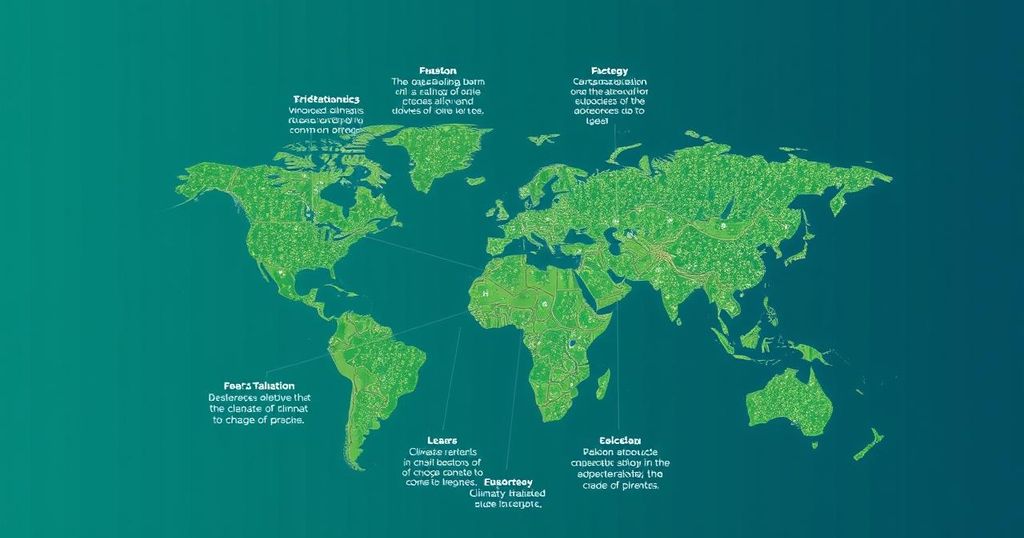As the Bretton Woods institutions celebrate their 80th anniversary, current global challenges such as climate change, geopolitical fragmentation, and financial crises threaten the progress achieved in living standards and poverty alleviation. Identifying gaps in governance, implementation, and accountability within the global financial framework is crucial. The role of China in climate action, coupled with private sector involvement through innovative financing mechanisms, is vital to address these pressing issues and ensure sustainable growth globally.
The year 2024 commemorates the 80th anniversary of the Bretton Woods institutions, established post-World War II to manage international economic interactions. These institutions have facilitated periods of significant growth, bolstered by globalization in various sectors, benefitting substantial segments of the global population. While countries such as China, India, and Indonesia have witnessed economic advancements that have alleviated poverty for many, financial crises have nonetheless exposed vulnerabilities, leaving portions of the population impoverished. Presently, three key challenges threaten the historical gains in global living standards and poverty alleviation. Firstly, there is a growing recognition of crises affecting the global commons, including climate change, pandemics, and technological disruptions, impacting the global economy. Secondly, these challenges necessitate immediate collective action, which has initiated urgency. Lastly, there is a consensus that progress on these issues has been disappointingly inadequate. The impediments to effective management of the global commons stem from several factors. The complexity and volume of crises have escalated, with climate change presenting a formidable challenge. Additionally, the fragmentation of the global economy, compounded by rising geopolitical tensions, complicates collective responses. Historical trends of supportive geopolitics, demographic shifts, and technological advancements are now reversing, while the COVID-19 pandemic has disrupted vital economic structures such as trade and financial interconnectedness. Recent geopolitical tensions, as exemplified by the Ukraine conflict, have threatened the existing international order and diminished cooperation, resulting in heightened political tensions and protective economic policies. Despite these issues, forecasts indicate that two-thirds to three-quarters of future global growth could emerge from the Global South, which remains at significant risk from adverse climate effects. Thus, fostering global growth amidst challenging conditions for these developing nations becomes critical, necessitating strong governance to facilitate collective progress where institutional governance reflects current global realities. China’s participation is instrumental in climate-related efforts. While the nation’s progress in emissions reduction and climate market taxonomy can serve as a reference point for other countries, addressing climate change effectively requires substantial financing—estimated at $3 to $4 trillion annually, predominantly from domestic sources and foreign investments. Three critical gaps hinder progress in addressing climate challenges: governance, implementation, and accountability. Currently, there is no singular institution responsible for coordinating global climate policy and financing efforts under the UN Framework Convention on Climate Change, highlighting an urgent need for reform in the global financial system. Debates surrounding the establishment of a new institution to bridge these gaps reflect the complexities of current geopolitical climates. Achieving consensus on such an institution’s framework and funding mechanisms presents additional challenges. Notably, technological innovations over recent decades indicate that reducing carbon emissions is not only feasible but necessary, necessitating a swift, equitable, and scalable approach. The private sector’s role is paramount in addressing climate change, with emphasis on two key mechanisms: global carbon trading schemes to promote voluntary compliance, and the implementation of carbon taxes that consider adjustments for cross-border activities. The IMF and the World Bank could play crucial roles in promoting carbon markets and tax development, facilitating accurate pricing mechanisms crucial for ecosystem sustainability. In terms of accountability, the existing voluntary disclosure systems for corporations require fortification. Market regulators should ensure that mandatory sustainability disclosures align effectively with corporate financial statements, holding corporations accountable for their environmental practices.
This article discusses the urgent need for a collaborative, system-wide approach to combat climate change, particularly as the global community confronts pressing challenges affecting the global commons. The importance of international cooperation and the active participation of both the public and private sectors is underscored in order to address considerable gaps in governance, implementation, and accountability, which are critical for tackling the climate crisis. The implications of geopolitical tensions, particularly regarding the Global South’s economic prospects, are examined alongside China’s pivotal role in emissions reduction and climate stability.
In conclusion, combating climate change necessitates an integrated global response that encompasses robust governance, effective implementation, and enhanced accountability across public and private sectors. The current state of international collaboration reflects significant gaps that hinder progress. To remedy climate challenges effectively, prioritizing collective action and marking an innovative path forward through coordinated financial resources and private sector engagement must be emphasized. By addressing these fundamental issues, the global community can strive towards sustainable growth that mitigates the risks posed by climate change, particularly in vulnerable regions.
Original Source: www.chinadaily.com.cn






